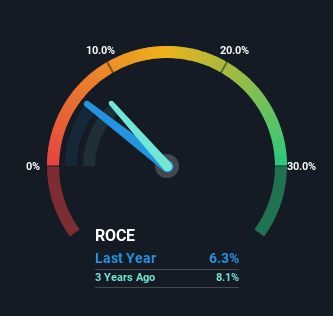TELUS (TSE:T) Will Be Hoping To Turn Its Returns On Capital Around
If you're looking for a multi-bagger, there's a few things to keep an eye out for. Ideally, a business will show two trends; firstly a growing return on capital employed (ROCE) and secondly, an increasing amount of capital employed. Basically this means that a company has profitable initiatives that it can continue to reinvest in, which is a trait of a compounding machine. However, after briefly looking over the numbers, we don't think TELUS (TSE:T) has the makings of a multi-bagger going forward, but let's have a look at why that may be.
Return On Capital Employed (ROCE): What Is It?
If you haven't worked with ROCE before, it measures the 'return' (pre-tax profit) a company generates from capital employed in its business. The formula for this calculation on TELUS is:
Return on Capital Employed = Earnings Before Interest and Tax (EBIT) ÷ (Total Assets - Current Liabilities)
0.063 = CA$2.9b ÷ (CA$56b - CA$9.4b) (Based on the trailing twelve months to June 2023).
Thus, TELUS has an ROCE of 6.3%. In absolute terms, that's a low return but it's around the Telecom industry average of 6.6%.
View our latest analysis for TELUS
In the above chart we have measured TELUS' prior ROCE against its prior performance, but the future is arguably more important. If you'd like, you can check out the forecasts from the analysts covering TELUS here for free.
What The Trend Of ROCE Can Tell Us
When we looked at the ROCE trend at TELUS, we didn't gain much confidence. Around five years ago the returns on capital were 10%, but since then they've fallen to 6.3%. However, given capital employed and revenue have both increased it appears that the business is currently pursuing growth, at the consequence of short term returns. If these investments prove successful, this can bode very well for long term stock performance.
What We Can Learn From TELUS' ROCE
Even though returns on capital have fallen in the short term, we find it promising that revenue and capital employed have both increased for TELUS. In light of this, the stock has only gained 21% over the last five years. So this stock may still be an appealing investment opportunity, if other fundamentals prove to be sound.
TELUS does have some risks, we noticed 4 warning signs (and 2 which shouldn't be ignored) we think you should know about.
If you want to search for solid companies with great earnings, check out this free list of companies with good balance sheets and impressive returns on equity.
Have feedback on this article? Concerned about the content? Get in touch with us directly. Alternatively, email editorial-team (at) simplywallst.com.
This article by Simply Wall St is general in nature. We provide commentary based on historical data and analyst forecasts only using an unbiased methodology and our articles are not intended to be financial advice. It does not constitute a recommendation to buy or sell any stock, and does not take account of your objectives, or your financial situation. We aim to bring you long-term focused analysis driven by fundamental data. Note that our analysis may not factor in the latest price-sensitive company announcements or qualitative material. Simply Wall St has no position in any stocks mentioned.

